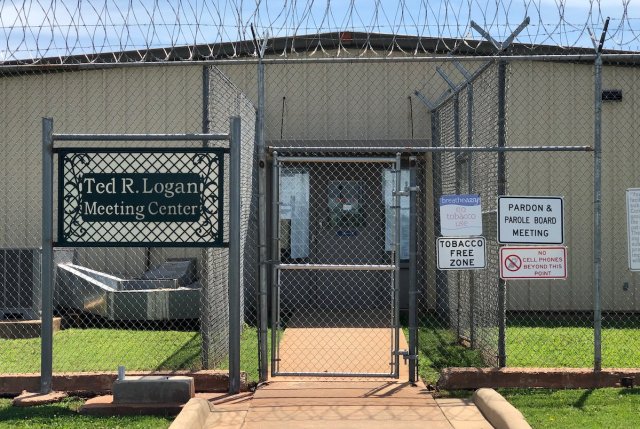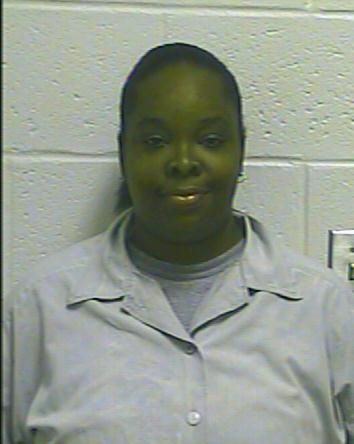

Tondalo Hall, an Oklahoma City woman serving 30 years in prison for permitting child abuse, had her application for sentence commutation advanced to a second stage during an Oklahoma Pardon and Parole Board meeting Monday.
Hall’s application for commutation moved to “stage two” of the process after a 5-0 vote. Currently incarcerated at Mabel Bassett Correctional Center, she will speak to the board via video call as part of that review stage.
If approved, her application would then be considered by Gov. Kevin Stitt.
“I think that it’s meaningful that her case is being reviewed again for the millionth time,” said Project Blackbird activist Candace Liger, who has advocated for Hall’s release. “The way we criminalize mothers, the way we criminalize woman, the way we criminalize black women, the way we criminalize domestic violence survivors (…) I think [Hall] deserves freedom.”
The board is set to meet again at 8:30 a.m. today in Oklahoma City, but Hall’s video conference is expected to occur in October, according to her attorney.
“She was so relieved she was in tears today just at the thought that people in power were listening to her story and paying attention,” said Megan Lambert of the American Civil Liberties Union’s Oklahoma chapter. “She misses her kids dearly.”
A total of 121 people were up for commutation review in Monday’s meeting.
Lambert left before the meeting concluded but said the decisions were roughly split between approvals and denials.
Fractured legs, fractured ribs, fractured family
In 2006, a 22-year-old Hall pleaded guilty to multiple counts of permitting child abuse against the youngest two of her three children. In 2004, her infant daughter and toddler son were diagnosed with broken legs and broken ribs, according to court documents.

Robert Braxton Jr., her boyfriend and the father of the two victimized children, ultimately pleaded guilty to abusing them as well. However, eight years of his 10-year sentence were suspended, and he was granted time served for the two years spent in jail awaiting trial.
The circumstances by which Braxton and Hall each pleaded guilty were complicated. Prosecutor Angela Marsee originally struck a deal with Hall to testify against Braxton.
“She had actually admitted to abusing her own children as well, and then she did have a deal to testify against her boyfriend, Braxton, who was a much more aggravated abuser of her children than she was,” Oklahoma County District Attorney David Prater said Monday afternoon.
Prater said Hall had pleaded guilty with an unspecified sentence prior to being called as a witness against Braxton.
“She got on the stand and completely lied about his involvement in hurting the children, and he was about to walk completely scott free,” Prater said. “She had entered a blind plea of guilty in front of Judge (Ray) Elliott before she testified, and he gave her 30 years when he saw that she had lied to protect her co-defendant.”
In a March 2019 letter to members of the Pardon and Parole Board, Prater said Hall’s testimony cast doubt on Braxton’s guilt and created a possibility for Braxton to receive custody of the abused children.
“After Ms. Hall testified, the prosecutor determined that she risked acquittal if she proceeded with the trial and allowed the jury to base their decision primarily on Ms. Hall’s evidence,” Prater wrote. “If Mr. Braxton was acquitted, he potentially would have been granted custody of the children. The prosecutor was forced to negotiate a plea with Ms. Hall’s co-defendant for a sentence much lower than the injuries to the children justified.”
Still, Prater said he is now supportive of Hall receiving commutation consideration, a sentiment he opened with in his letter.
“Does she deserve 30 years? No, I think she deserves a break now,” Prater said Monday. “Her children — who are almost grown — now want to have a relationship with their mother outside of prison.”
Liger, who resides in North Carolina but previously worked for the ACLU of Oklahoma, said Hall “never deserved to be behind a cage.”
“She took the fall for another person’s abuse,” Liger said. “And I think that it’s one of the most disheartening things I’ve ever witnessed in my life.”
Lambert, the ACLU attorney, told NonDoc that Hall did not abuse her children and was, herself, a victim of Braxton’s abuse.
“I don’t think she knew. In fact, the abuse that led to the swelling that led to her calling and taking them to the hospital and the arrest, that happened the night that she was gone with her father secretly looking for houses so that she could try to get away from him,” Lambert said. “So she had no actual knowledge of the abuse. Now, granted, in hindsight from a perspective when someone is outside of abuse no longer experiencing domestic violence, yeah, if someone is abusing me then I think there’s a fair chance that they are abusing the kids. But that is not the mindset that someone in the middle of abuse is going to have.”
Prater criticized the ACLU and criminal justice reform advocates for not telling “the whole story” about cases like Hall’s.
“They give you about a quarter of the story, and everybody says, ‘Oh my gosh, how could that have happened?’ Well it could happen because you don’t know the next 75 percent of the story,” Prater said.
But Lambert said Hall’s story is one of at least two dozen examples where Oklahoma’s “failure to protect” law has yielded lopsided prison sentences.
“Often, the actual abuser will receive a shorter sentence or will receive no prison time at all, and the woman will be incarcerated and locked behind bars for the entirety of her child-bearing years,” Lambert said. “We don’t think that is a coincidence. What we think it is is a manifestation of sexism and the sphere of domesticity.”
Hall: ‘At first I was lying’
Court documents show that a cousin of Hall’s said Braxton was “very controlling and kept Hall away from her family.”
Hall, now 35, has been denied commutation twice already by the Oklahoma Pardon and Parole Board: once in 2015 and again in 2018.
In her first commutation application filed in 2014, Hall stated that Braxton regularly choked her, gave her black eyes, threw objects at her and verbally assaulted her.
“I did not escape the relationship out of fear that Robert would file for custody of our children and I would never be allowed to see them again,” Hall said in her 2014 commutation application.
During the trial, Hall said the abuse from Braxton did not stop, and that he continued to intimidate her through the proceedings. She initially said she lied to investigators so that her children would not be taken from her, according to court documents.
“At first I was lying, and I told her I didn’t know how it happened,” Hall testified during the trial. “And then I told her that I did it.”
In March 2009, Hall wrote a letter of apology to Judge Ray Elliott, stating that she had lied and that she has come to understand “that it is better to tell the truth than to tell a lie.”
“I need to apologize to you for my actions and for my attitude,” Hall wrote in the letter, which is embedded below.
Marsee, the prosecutor who originally handled Hall’s case, discussed its complexities in court, according to documents.
“I have a real problem putting her in the same shoes as him,” Marsee said. “He definitely should have received a more significant sentence, but because of her minimizing and continuing to protect herself and protect him, that had a real impact on what we were able to do with him in the jury trial. So she should not benefit from that.”
David Prater’s letter to the Pardon and Parole Board
https://nondoc.com/wp-content/uploads/2019/07/HALL_Prater-Letter-to-PPB.pdf” height=”450px” download=”all”]Tondalo Hall’s letter to Judge Ray Elliott
https://nondoc.com/wp-content/uploads/2019/07/HALL_letter-of-apology-to-Court.pdf” height=”450px” download=”all”](Correction: This story was updated at 4:40 p.m. Tuesday, July 16, 2019, to correct a word within one of Lambert’s quotes. NonDoc regrets the error.)




















